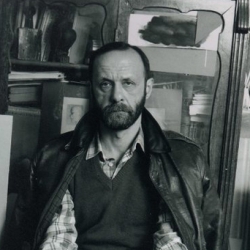
Garif Basyrov was born in 1944 in ALZHIR (the Russian acronym for the Akmolinsk Camp for Wives of Traitors of the Homeland), aka Point No. 26 on the Karlag map. In the 1960s, he studied in Moscow, first at the then well-known art high school (MSKhSh) under the Surikov Institute and then at the Art Department of the Institute of Cinematography (VGIK). His graduation project was a set of illustrations to Bulgakov's Master and Margarita, which is now mandatory reading on the school curriculum but in those years was virtually forbidden and mostly available in samizdat form. One of his early exhibitions took place in 1970 in the editorial office of Yunost' (Youth) magazine, another legendary place of the period. Many people first came to know him as an illustrator of the magazine Khimia i zhizn (Chemistry and Life), which was an island of liberal thinking in vast marshes of cultural stagnation that characterized the Brezhnev Era.
Basyrov tried his hand at a number of different graphical techniques including printing (etching and lithography) and drawing in pencil and ink, coming to prefer the latter. He experimented with letters and sign systems, abstract collages and sculptural assemblages, surprising viewers (who were not often quite ready to be surprised) year after year. 'Inhabited Landscapes', 'Townsfolk in the Countryside', 'Space', 'Apocrypha', 'Cornered', 'Long Summer', 'Under the Load', 'Archaic', 'Trivia',' Incubi':
I work on what I find personally interesting, what really excites me, - he wrote. Like ancient Zen Buddhist poets and artists who changed their names and started from scratch at the age of forty after achieving the peak of their careers, Basyrov never marked time by replicating his own achievements and resting on his laurels but moved always forward from series to series, from project to project, from figurative art to abstract art, from easel works to sculpture, living one life in art after another.
Garif Basyrov died the day before his sixtieth birthday. His archive revealed plans for more projects, always unexpected and always 'about something else':
